
The Total Guide to NetSuite ERP: What is NetSuite ERP?
Our guide covers everything you need to know about NetSuite ERP, including integration, market fit, pricing, features, and comparisons. Access our free E-book to learn more about automating accounts payable and global mass payments with NetSuite.
What is NetSuite ERP?
NetSuite ERP (enterprise resource planning) is a business management software that handles a variety of processes and business functions on a true cloud platform.
In 2016, Oracle purchased NetSuite for $9.3 billion. Today, over 40,000 companies worldwide use Oracle NetSuite ERP to manage their business.
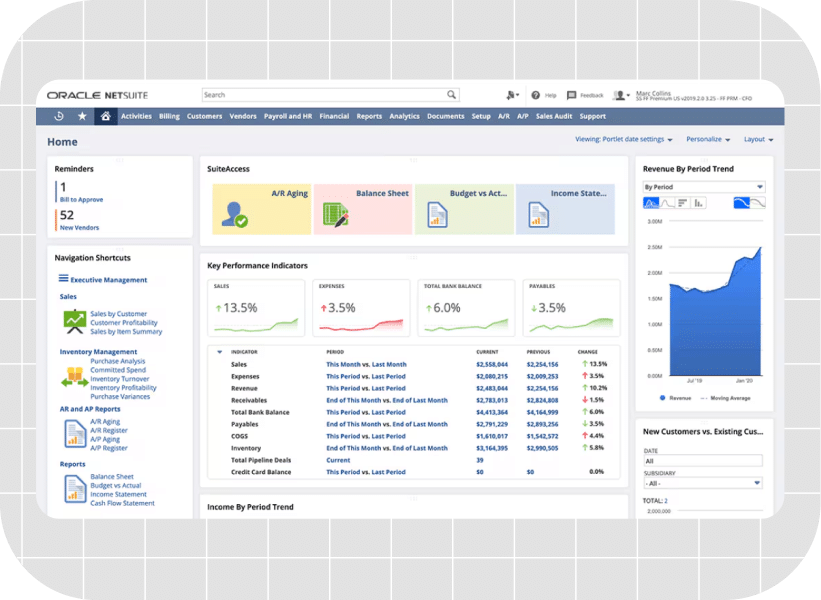
Features
Key Features and Benefits of NetSuite
NetSuite is an ERP system that works well for financial management and reporting and provides business intelligence with SuiteAnalytics. It offers actionable insights and real-time visibility for decision-making and managing KPIs. Businesses can use it to automate manual processes as well as track inventories, manage their supply chain, and improve warehouse efficiencies. The ERP platform supports businesses that operate on a global scale with more than 190 currencies and 27 languages.

Complete Cloud Solution
NetSuite is a true cloud system with multi-tenancy, not requiring users to have in-house servers. The latest version of NetSuite software is always available in the cloud, and your customizations continue to work as NetSuite enhances the product.

Scales With Your Company’s Growth
NetSuite uses service tiers for scalability so your company can meet its volume and capacity requirements without bottlenecks.

Handles Revenue Recognition
NetSuite ERP software automates revenue recognition following GAAP and IFRS standards. NetSuite capabilities for revenue recognition include revenue scheduling, allocation by schedule or milestone, and reporting, with line item links to contracts.

Manages User Billing
NetSuite’s Subscription Billing Enhanced UI SuiteApp lets your software company set up price books with customer price plans and currency, tiered or volume pricing model, discount, charge frequency, repeat every, and proration parameters.

Meets Public Company Reporting Needs
NetSuite has a robust financial infrastructure to meet the needs of public companies with traditional IPOs or SPAC deals. Since 2011, 63% of tech IPO companies have used NetSuite ERP solutions.

Analytics and Real-Time Dashboards
NetSuite SuiteAnalytics provides KPIs, analytics, and real-time dashboards to measure your company’s success and assist in making informed decisions.

Global, Multi-entity Module
NetSuite OneWorld is for global businesses operating internationally. OneWorld manages multiple subsidiaries and business entities with global legal compliance, multi-currency, and consolidation. According to the NetSuite OneWorld Guide, it’s available upon initial implementation or as a one-time upgrade for existing NetSuite users. Once implemented, OneWorld is irreversible. Oracle NetSuite provides a high level of overall customer satisfaction and full customer support with an upgrade to Premium SuiteSupport.

NetSuite Expense Management
NetSuite SuiteProjects provides automated employee expense management software, using the NetSuite mobile app for expense submissions related to project accounting for employee reimbursement and client billing.

NetSuite Procurement
NetSuite Procurement software includes sourcing for vendor selection, purchase management status and tracking, invoice processing, and vendor management.

Corporate Card and Personal Credit Card Recording
Although NetSuite doesn’t issue corporate cards, to facilitate accounting, NetSuite ERP has an accounting feature that will link either your company’s corporate spending card or an employee’s personal credit card to line items in expense reports.
Modules
NetSuite Modules
NetSuite ERP consists of various modules to meet your business needs. NetSuite ERP modules include:
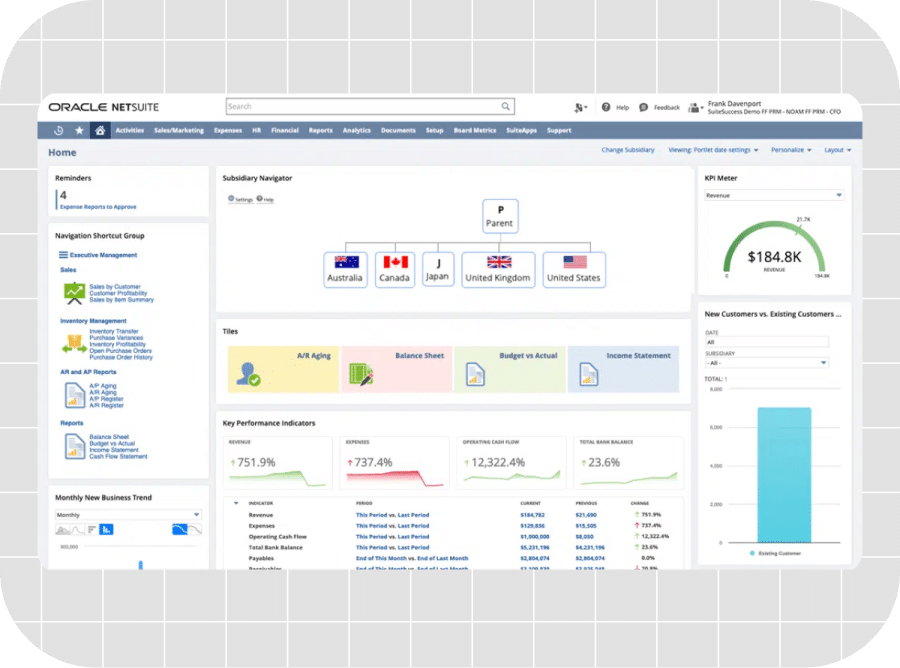
NetSuite OneWorld
The NetSuite OneWorld module has these features:
- Multi-entity
- Multi-currency support for over 190 currencies
- Multi-language support for 27 languages
- Global accounting and consolidation enables organizations to comply with different accounting and financial reporting standards
- Consolidated financial statements that simplify financial reporting across the company
- Indirect tax management streamlines tax compliance, with tax code and reporting support for over 110 countries
- Audit and compliance reporting enables organizations to stay compliant with international IT and security requirements
- Electronic payment support for global expenses
Cloud ERP
- Accounting software automates manual processes, simplifies regulatory compliance, and offers accounting insights in real time
- Global business management (NetSuite OneWorld) lets you manage the capabilities of multiple business units on a global scale
- Financial management allows organizations to track a variety of financial processes, such as bank reconciliation and revenue management
- Inventory management provides an overview of product availability across different locations and distribution channels
- Order management tracks all stages of order fulfillment, including more complicated tasks such as split shipments
- Warehouse management automates manual tasks and expedites order fulfillment
- Supply chain management helps organizations manage their goods at every stage of the supply chain, preventing stockouts and manufacturing delays
- NetSuite Manufacturing is a NetSuite product bundled as an industry solution for production management that includes sales order management, planning & scheduling for work orders, supply chain, procurement with purchase orders, real-time shop floor control, quality management, and CRM/marketing.
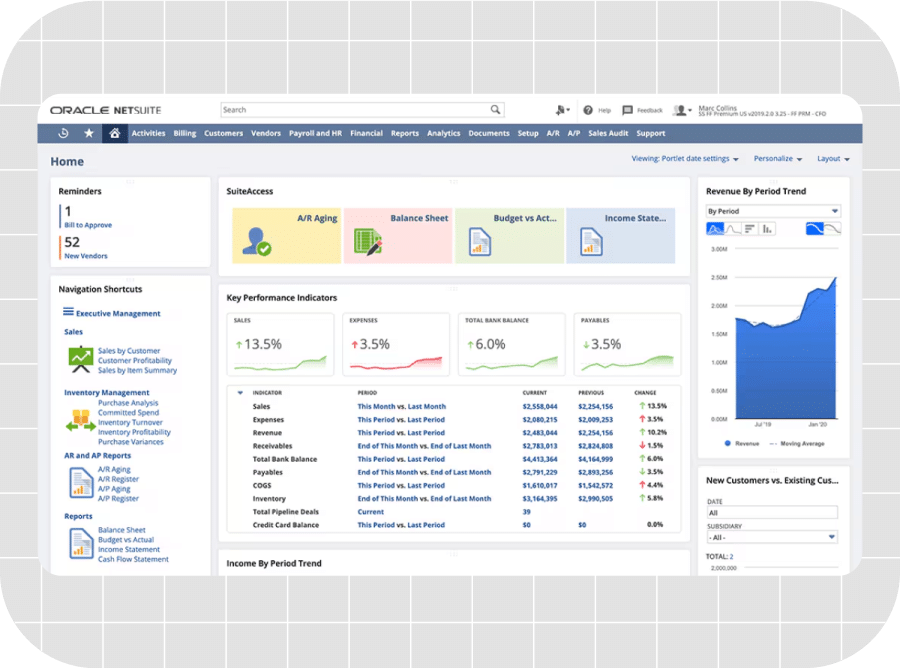
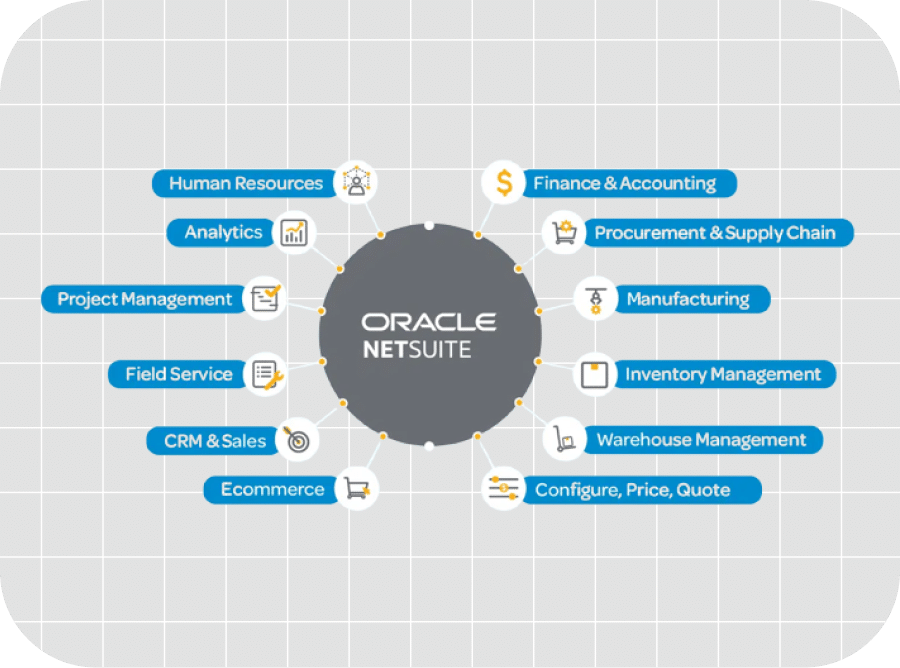
Other Modules
- Analytics allows organizations to measure and track business performance.
- SuitePeople Human Resource Management System (HRMS) combines human capital management and payroll solutions and helps companies improve employee engagement.
- Professional Services Automation (PSA) allows organizations to manage projects and track data, from metrics to resources.
- NetSuite Commerce, including SuiteCommerce, a B2C and B2B solution for e-commerce, and point of sale (POS), allows businesses to manage separate functions in one platform, such as inventory management and customer service.
- Customer Relationship Management (CRM) includes features like sales force automation, creating sales forecasts, customer service management, and marketing automation.
Oracle NetSuite ERP integrates with NetSuite CRM and Salesforce for customer relationship management and other third-party add-ons for a complete software solution.
Ready to master AP and global mass payments with NetSuite?
NetSuite is essential for finance, but AP often needs specialized solutions. See how executives are optimizing AP and global payables efficiency within NetSuite.
Industries
Industries Using NetSuite
Many industries, including product, service, and financial businesses, non-profit organizations, and government entities, use the NetSuite ERP system.

Tech & Software

IT Services

Professional Services

Consulting

Financial

Retail & E-commerce

Apparel, Footwear & Accessories

Manufacturing

Wholesale Distribution

Transportation & Logistics

Sciences

Healthcare

Health & Beauty

Energy

Food & Beverage

Restaurant & Hospitality

Education

Campus Stores

Nonprofit

Government

Advertising & Digital Marketing Agencies

Media & Publishing
Implementation
How to Implement and Use NetSuite
The ERP implementation process can take anywhere from a month to over a year. The exact timeline will vary depending on the size of your organization, but a cloud-based ERP is faster to implement than an onsite solution.
NetSuite singles out several best practices for successful ERP implementation, including:
Resources to implement and learn NetSuite include the online NetSuite Basics guide, NetSuite videos on YouTube, NetSuite Role-Based Demos videos for the Controller, CFO, CIO, Sales Manager, Operations Manager, Support Representative, and Omnichannel. You may be able to use a trial account to learn NetSuite as well.
Step 1
Team
Put together a dedicated implementation team (which might include hiring a consultant). The cross-functional team with a project leader and CEO support will begin with a team-building meeting, collaborative planning and goal setting, reviewing workflows, and determining which third-party software integrations are needed.
Step 2
Goals
Establish goals that an ERP solution will help your organization achieve (e.g., improving customer service, lowering costs).
Step 3
Collaborate
Collaborate across teams to understand the purpose of an ERP solution, set expectations, and solve issues
Step 4
Data Migration Plan
Plan how you’re going to migrate data, and decide whether you’ll do it manually or using automation.
Step 5
Training
Invest in employee training.
Step 6
Feedback
Gather feedback from users to identify challenges and improve future experiences
How Does AP Automation Software Integration Work With NetSuite?
NetSuite integrates with AP automation software through an API or flat file connection. Tipalti accounts payable automation software seamlessly integrates with NetSuite ERP using an API connection. Tipalti syncs data with NetSuite ERP, including suppliers, purchase orders, receiving data, supplier invoices, payments, and vendor credits. Tipalti automates batch payment reconciliation with the NetSuite general ledger in real-time.
Tipalti is an approved NetSuite partner. Users can access the Built for NetSuite, award-winning Tipalti add-on SaaS software SuiteApp through the NetSuite login to streamline accounts payable and payments workflow. This saves time by up to 80%, starting with self-service supplier onboarding.
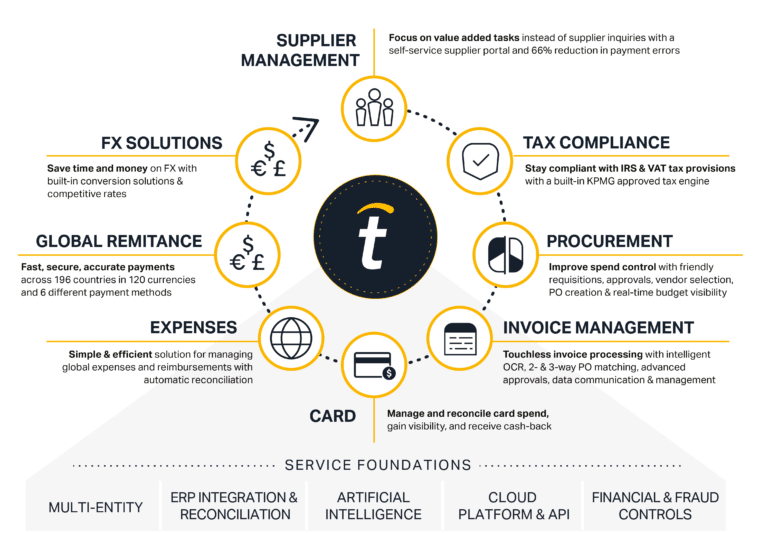
Tipalti AP automation software works in combination with the Tipalti Expenses product to reimburse employee expense claims submitted as data captured from digital photos and approved through a mobile app that checks for company travel & expense policy compliance. Tipalti AP automation also works with modular products, Multi-FX and FX Hedging, to gain advanced foreign exchange functionality and lock in FX rates for accounts payable. With Multi-FX, companies use one centralized virtual account (instead of establishing an international regional bank network) to make and manage global payments for all subsidiaries, currencies, and payment methods.
In addition to AP automation software, Tipalti’s unified finance automation software platform includes an optional Procurement product to automate purchase requisitions and automatically create purchase orders. Tipalti also offers a Mass Payments product for payouts to affiliates, creatives, streamers, publishers, influencers, and independent contractors.
Tipalti offers an employee-issued corporate spending card called Tipalti Card that offers rewards and lets your company manage spending.
Recommendations
You may also like
NetSuite ERP FAQs
What is ERP software?
ERP software for enterprise resource planning is an organization-wide system with a unified database to perform accounting and financial planning, manage functional business processes, and generate financial reports and insightful business intelligence for decision-making.
What is NetSuite?
NetSuite cloud ERP is a mid-range system with many optional modules and Suites for fast-growing small businesses and mid-market companies that use NetSuite.
Is NetSuite an ERP?
Yes, NetSuite is a true cloud ERP solution.
How much does NetSuite cost?
The NetSuite software cost is customized based on the software modules and Suites selected and the number of users. The licensing fee starts at an estimated $999 per month, plus $99 per month per user. First-time users must also pay an implementation fee. The starting price is lower than high-end Oracle ERP and SAP.
NetSuite cost includes SaaS software costs, NetSuite training, NetSuite implementation with the SuiteSuccess program, an upgrade to Premium Customer Support, and third-party add-ons.